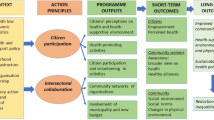Abstract
We have introduced elsewhere (Taket and White, 2000), a framework that we have developed, called PANDA (participatory appraisal of needs and development of action), which we use as we plan and implement group working and group decision-making in the multi-agency setting. We devel-oped PANDA in the process of critically reflecting on our own practice and that of others. Much of our own practice (both individually and together) has been in the field of community operational research. Underlying PANDA are a number of theoretical principles, which we label pragmatic pluralism. PANDA is based on a theoretical stance that we unashamedly label post-structuralist or postmodernist (Taket and White, 1993), and as such, makes no grand claims for being uniquely justifiable, or for devel-oped success in application. PANDA represents one particular type of multimethodology.
Access this chapter
Tax calculation will be finalised at checkout
Purchases are for personal use only
Preview
Unable to display preview. Download preview PDF.
Similar content being viewed by others
References
Ashby, W.R. (1958). Requisite variety and its implications for the control of complex systems. Cybernetica 1, 83–99.
Bateson, G. (1972). Steps to an Ecology of Mind. Jason Aronson, Northvale, NJ.
Beer, S. (1956). The impact of cybernetics on the concept of industrial organization. Reprinted in How Many Grapes went into the Wine: Stafford Beer on the Art and Science of Holistic Management. Harnden, R. and Leonard, A. (eds.). Chichester, Wiley, 1994.
Beer, S. (1962). Towards the cybernetic factory. Reprinted in How Many Grapes went into the Wine: Stafford Beer on the Art and Science of Holistic Management. Harnden, R. and Leonard, A. (eds.). Chichester, Wiley, 1994.
Beer, S. (1966). Decision and Control: The Meaning of Operational Research and Management Cybernetics. Chichester, Wiley.
Beer, S. (1995). Beyond Dispute. Chichester, Wiley.
Bryant, J. (1993). Supporting management teams: AIDA, groupware and computer group decision support systems. OR Insight, 6(3), 19–27.
Burrell, G. and Morgan, G. (1979). Sociological Paradigms and Organisational Analysis. London, Heinnemann.
Chapman, C.B. (1992). My two cents worth on how OR should develop. Journal of the Operational Research Society, 43(7), 647–664.
Deleuze, G. and Guattari, F. (1980). A Thousand Plateaus: Capitalism and Schizophrenia. Tr. B. Massumi. London, Athlone, 1988.
Eden, C. (1990). The unfolding nature of group decision support-two dimensions of skill. In Tackling Strategic Problems: The Role of Group Decision Support, pp. 48–52, Eden, C. and Radford, J. (eds.). London, Sage.
Emery, F.E. and Trist, E.L. (1981). Sociotechnical Systems. Sytsems Behaviour (ed.). Open Systems Group, Open University, Chapman, London.
Flood, R.L. and Jackson, M.C. (1991). Creative Problem Solving: Total Systems Intervention. Chichester, Wiley.
Friend, J. and Hickling, A. (1987). Planning Under Pressure: The Strategic Choice Approach. Pergamon, Oxford.
Haraway, D.J. (1985). A manifesto for cyborgs: Science, technology and socialist feminism in the 1980s. Socialist Review, 80, 65–108.
Haraway, D.J. (1991). Simians, Cyborgs and Women: The Reinvention of Nature. London, Free Association Books.
Jackson, M.C. and Keys, P. (1984). Towards a system of systems methodologies. Journal of the Operational Research Society, 35, 473–486.
Keys, P. (1991). Operational research in organizations: A metaphorical analysis. Journal of the Operational Research Society, 42(6), 435–446.
Mattelart, A. and Mattelart, M. (1992). Rethinking Media Theory. University of Minnesota Press, Minneapolis.
Maturana, H.R. and Varela, F.J. (1992). The Tree of Knowledge: The Biological Roots of Human Understanding. Revised edition. Shambhala, Boston.
McCulloch, W. (1965). Embodiments of Mind. MIT Press, Cambridge, MA.
Morgan, G. (1986). Images of Organisation. Sage, California.
Owen, H. (1992). Open Space Technology: A User’s Guide. Abbott, Potomac, Maryland.
Rorty, R. (1991). Objectivity, Relativism, and Truth: Philosophical Papers, Volume 1. Cambridge University Press, Cambridge.
Sontag, S. (1979). Illness as Metaphor. Allen Lane, London.
Sontag, S. (1989). AIDS and its Metaphors. Allen Lane, London.
Spencer, H. (1994). The man versus the state. In Herbert Spencer: Political Writings, Offer, J. (ed.). Cambridge University Press, Cambridge.
Taket, A.R. and White, L.A. (1993). After OR: An agenda for postmodernism and post structuralism in OR. Journal of the Operational Research Society, 44(9), 867–881.
Taket, A.R. and White, L.A. (1994). Doing community operational research with multicultural groups. Omega: International Journal of Management Science, 22(6), 579–588.
Taket, A.R. and White, L.A. (1996). Pragmatic pluralism-an explication. Systems Practice, 9(6), 571–586.
Taket, A.R. and White, L.A. (2000). Partnership and Participation: Decision-making in the Multiagency Setting. Chichester, Wiley.
Walsham, G. (1991). Organisational metaphors and information systems research. European Journal of Information Systems, 1(2), 83–94.
Wiener, N. (1948). Cybernetics: Control and Communication in the Animal and Machine. New York, Wiley.
Wittgenstein, L. (1969). Blue and Brown Books. Penguin, Harmondsworth.
Author information
Authors and Affiliations
Editor information
Editors and Affiliations
Rights and permissions
Copyright information
© 2004 Springer-Science+Business Media New York
About this chapter
Cite this chapter
Taket, A., White, L. (2004). Playing with PANDA: The CybOrg and the Rhizome. In: Midgley, G., Ochoa-Arias, A. (eds) Community Operational Research. Contemporary Systems Thinking. Springer, Boston, MA. https://doi.org/10.1007/978-1-4419-8911-6_11
Download citation
DOI: https://doi.org/10.1007/978-1-4419-8911-6_11
Publisher Name: Springer, Boston, MA
Print ISBN: 978-1-4613-4716-3
Online ISBN: 978-1-4419-8911-6
eBook Packages: Springer Book Archive




